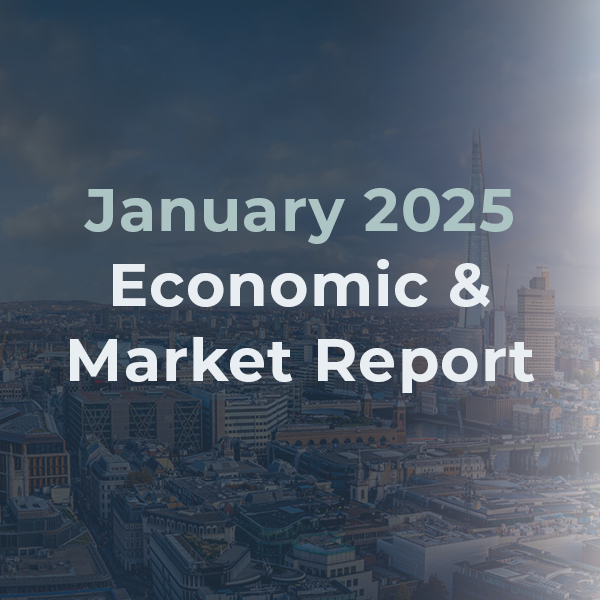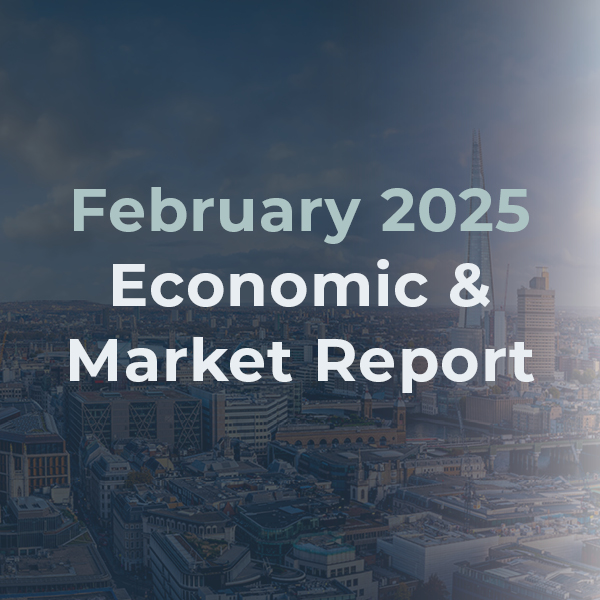Market Insight
January 2025 Economic and Market Report
This Article was Written by: Chris Proudfoot - Fundhouse
Economic & Market Report, Market Report
Economic Commentary
In January, we learned that consumer prices in the UK rose by 2.5% in the 12 months to December; a number that has remained consistently above the Bank of England’s 2% target since last summer and shows no signs of falling materially. Chancellor Rachel Reeves’ Autumn budget contained considerable spending commitments that have likely contributed to this, in particular wage settlements and public service boosts.
International attention was mostly focused around President Trump’s January 20th inauguration, and the 50+ executive orders signed within his first few days, including: international tariffs, widespread deregulation, a sovereign wealth fund, energy projects, foreign aid cuts, and federal efficiency drives. Strikingly, he clashed with the Federal Reserve (the Fed) after they decided to hold US interest rates in a range of 4.25% to 4.5% at their January meeting, on the back of reasonable growth and jobs data – he criticised them for not cutting rates to make borrowing conditions easier for US companies and households. Further pressure from the President may make investors wonder whether the independence of the Fed will remain a permanent feature or not.
Against the backdrop of US trade rhetoric and weak growth numbers for the continent, the European Central Bank (ECB) announced an interest rate cut of 0.25% to 2.75%, its fifth cut since summer 2024.
Market Commentary
January was full of market headlines and volatility, but most major asset classes delivered positive returns both in sterling and local currency terms. In the US, we saw Nvidia stock collapse 17% in a single day, wiping $600bn off its market value. This was on concerns that the Chinese AI company DeepSeek had produced an AI model so efficient that it would materially impact global demand of Nvidia’s AI-empowering chips. The wider US market did well, however, with a mix of winners and losers from President Trump’s ongoing ‘America First’ approach to trade. Japanese stocks were flat, but Europe enjoyed a boost from luxury goods products selling well overseas.
In the UK, government bond (‘gilt’) prices fell to levels that implied high future borrowing costs for the UK government – in fact the highest since the financial crisis. This was a result of a falling confidence in the ability of Chancellor Rachel Reeves to deliver economic growth whilst also keeping borrowing in check, as well as expectations of more stubborn UK inflation. The UK stock market did surprisingly well, however, closing at record highs. This was attributed to its blend of international revenue exposures combined with the weakest sterling/dollar rate for over a year, as well as low valuations vs most other major markets, all of which drove overseas interest in British companies.
January served as a reminder that short-term news is not always reflected in investment returns as one might expect. Despite concerns around the UK government, the UK stock market rose, and despite concerns around US tariffs affecting Europe, that market was up. We also saw what can happen to richly valued stocks that are ‘priced for perfection’ (e.g. the biggest US tech companies) – even small bits of news can derail the optimistic narratives around them, having a devastating impact on their stock prices.
Speak to the team: mps@fundhouse.co.uk.
Risk Warning
This article is provided for information purposes only. All
material(s) have been obtained from sources believed to be reliable, but
accuracy is not guaranteed. The views and opinions expressed are the views of
Fundhouse and are subject to change based on market and other conditions.
Fundhouse is the trading name of Fundhouse Bespoke Limited. Fundhouse provides
investment management services to professional clients and does not provide
financial advice. Importantly, this note does not represent investment advice,
and any reader should always speak to their financial adviser before making any
investment decisions. Please note that the value of any investment may go down
as well as up, and you may lose capital when investing, and the value of your
investments may not always increase. Please ensure that you are comfortable
bearing financial losses and that you are comfortable taking a long-term
investment view of five years or more.










